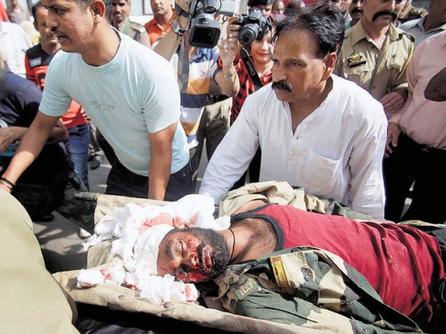New Delhi, Oct 22: The Border Security Force (BSF) on Friday claimed to have killed at least seven Pakistan Rangers personnel in Hiranagar, Jammu, in retaliation for a sniper attack that injured one of their men along the International Border.

A BSF official said the sniping incident came after a lull of almost 15 months. Officials cautioned that it was a worrying development as the 192 km IB in Jammu had not witnessed any cross-border firing even after the September 29 strikes.
This is also the first time such heavy casualties have been inflicted on the Rangers in the past five years. BSF sources said the deaths had been confirmed by reports of their observation posts and by intercepts of Pakistani wireless communication.
In a statement on Friday, the BSF said it launched an “aggressive offensive” in response to the sniper attack and gave a “befitting reply”, killing one militant and seven Pakistan Rangers personnel.
The BSF also asked district officials to make necessary arrangements if villages along the border need to be evacuated in the event of shelling and firing from Pakistan.
The Pakistan Army however, claimed that there was no loss of life on its side in firing at the border. DG Inter-Services Public Relations (ISPR) Lt. Gen. Asim Bajwa tweeted, “Indian claim of hitting or killing any Pakistani soldier/Ranger with firing at anytime of today at LOC/working boundary absolutely false.”
BSF constable injured
BSF officials said that Constable Gurnam Singh (24) was shot in the head by a sniper in the Hiranagar sector along the International Border in Jammu on Thursday when he was standing guard at one of the check posts.
Officials said Mr. Singh was one of the eight men who, on the intervening night of October 19-20, had thwarted an infiltration attempt and successfully pushed back four or five militants in Bobiyan village of Hiranagar.
“Barely 24 hours after the infiltration bid, there was a sniper attack. We decided to give a befitting reply and launched an offensive. At least one militant and seven Pakistan Rangers personnel have been killed,” said the BSF official. Singh has been admitted in a critical condition to a Jammu hospital.
Flag meeting held
On Thursday, the BSF held a flag meeting with the Pakistan Rangers and apprised them of the infiltration attempt by militants from their territory.
“As usual Pakistan Rangers denied the allegations and said they were not aware of any such infiltration attempt. Today we gave a strong reply. The Rangers tried to reach us on the hotlines on Friday but we have not responded so far,” said the official.
Fewer violations
An official said incidents of sniping had come down to nil since the two forces guarding the border had held a meeting in August last year. New lines of communication were opened and they had resulted in reduced tensions. As compared to 350 ceasefire violations in the Jammu sector till August 2015, only three such violations were reported after the two forces held talks.
In the past three years, officials had witnessed a trend where maximum infiltration attempts and ceasefire violations happened along the IB, which runs along the populated Jammu district. In 2013, there was massive displacement of villagers living along IB in Jammu.





Comments
Add new comment